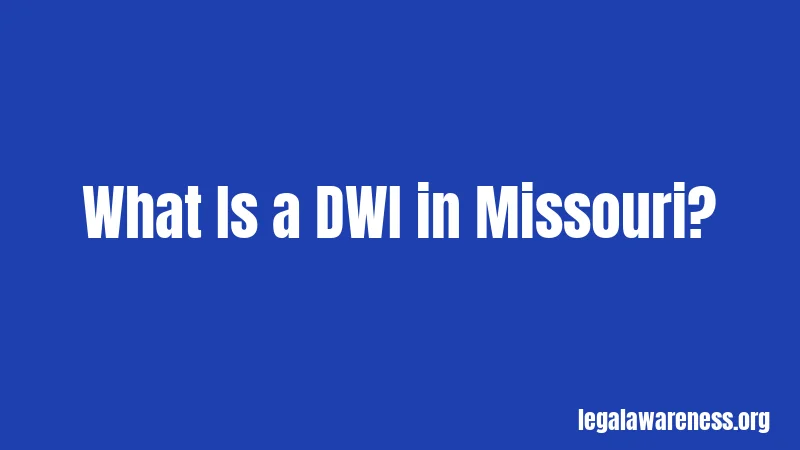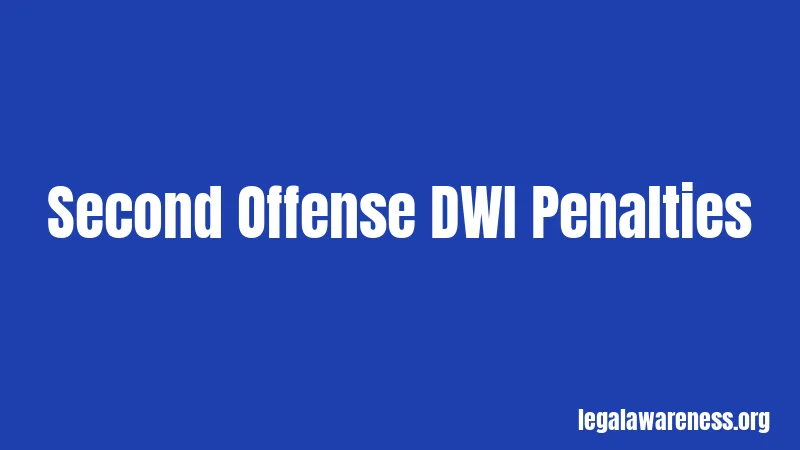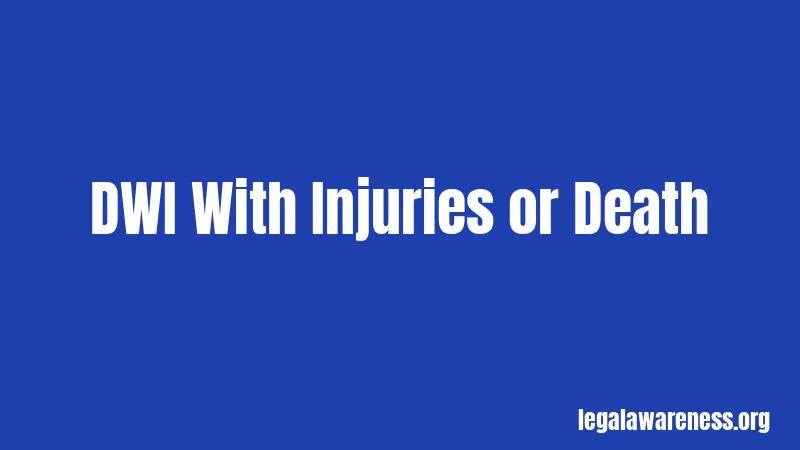DUI Laws in Missouri (2026): Penalties That Actually Hurt
Most people think they know what a DUI means. But here’s the thing—Missouri calls it a DWI, and the penalties are way stricter than you might expect. Seriously. We’re talking jail time, massive fines, and losing your license for months or even years. Let me break down exactly what you’re facing if you get pulled over with too much alcohol in your system.
What Is a DWI in Missouri?

DWI stands for Driving While Intoxicated. That’s Missouri’s legal term for drunk or drugged driving.
You can get charged with a DWI in two ways. First, if your blood alcohol content (BAC) is 0.08% or higher. Second, if you’re impaired by alcohol or drugs—even if your BAC is under 0.08%. Yep, that means prescription medications can get you in trouble too.
Here’s something most people miss. You don’t even have to be driving. If you’re sitting in the driver’s seat with the engine running, that counts as “operating” a vehicle. Missouri courts confirmed this in 2024. So if you’re drunk and turn on your car to stay warm? You could face DWI charges.
The BAC limit drops to 0.04% for commercial drivers. And if you’re under 21? Missouri has a zero-tolerance policy. Any detectable BAC over 0.02% can get you charged.
First Offense DWI Penalties
Okay, so you got pulled over. It’s your first DWI ever. What happens next?
A first offense is a Class B misdemeanor. The maximum penalties include up to six months in jail and fines up to $1,000. Plus court costs. Plus fees for getting your license back. The costs add up fast.
Your license gets suspended for 30 days. After that, you face 60 days of restricted driving privileges. You might be able to get a Restricted Driving Privilege (RDP) with an ignition interlock device installed. More on that later.
But wait, it gets more serious if your BAC was high. If you blew a 0.15% to 0.19%, you must serve at least 48 hours in jail. No exceptions. If your BAC was 0.20% or higher? You’re looking at a minimum of five days behind bars.
You also have to complete something called SATOP. That’s the Substance Awareness Traffic Offender Program. It’s mandatory. The assessment alone costs $375, and the education program is another $200. Total minimum cost? Around $575 just for SATOP, not counting your fines and legal fees.
Sound complicated? It’s actually worse than it sounds.
Second Offense DWI Penalties

A second DWI within five years is a Class A misdemeanor. Now the penalties jump way up.
You face up to one year in jail. The mandatory minimum is 10 days before you’re even eligible for probation. Some judges might let you do 240 hours of community service instead. But that’s a lot of hours.
Fines go up to $2,000. Your license gets revoked for five years. Five years. That’s not a typo. And you’ll need an ignition interlock device for at least six months when you finally get limited driving privileges back.
The SATOP program? You have to do it again. And this time, they might require the Weekend Intervention Program. That’s a marathon weekend of classes in a restrictive environment. It costs around $467.
Most people don’t realize how strict these laws are. Second offenses basically guarantee you’re losing your license for a long time.
Third Offense and Felony DWI
Here’s where things get really serious. A third DWI is a Class E felony.
Felonies are no joke. You’re looking at up to four years in prison. The mandatory minimum is 30 days in jail before probation is even an option. Or you can do 60 days of community service instead.
Fines jump to $10,000. Your license gets denied for 10 years. Ten. Years.
And it gets worse. Once you have two prior DWI convictions, Missouri can use those to enhance charges for life. There’s no time limit. A fourth DWI is a Class C felony with up to seven years in prison. A fifth or more? That’s a Class B felony with 5 to 15 years.
Think of it like this: your third DWI changes everything. You’re now a felon. That follows you forever.
DWI With Injuries or Death

If you hurt or kill someone while driving drunk, the charges escalate fast.
Causing physical injury to another person is a Class E felony. If you injure a cop or emergency worker, that’s a Class D felony. Causing serious injury to anyone is also a Class D felony. Up to seven years in prison.
Causing death while driving drunk? That’s typically a Class C felony with 3 to 10 years in prison. But if you kill a cop, emergency worker, or two or more people, it becomes a Class B felony. Or if your BAC was 0.18% or higher and you caused a death. Then you’re facing 5 to 15 years.
Honestly, this is probably the most important rule to understand. DWI isn’t just about you—it’s about everyone else on the road.
How Missouri’s Implied Consent Law Works
When you get your Missouri driver’s license, you automatically agree to take a breath, blood, or urine test if a cop suspects you of DWI. That’s called implied consent.
If you refuse the test, your license gets revoked for one year. Immediately. This is separate from any criminal charges.
You have 15 days from your arrest to request an administrative hearing with the Missouri Department of Revenue. Don’t miss that deadline.
Two Separate Processes You’re Facing
Hold on, this part is important. When you get arrested for DWI, you’re dealing with two completely separate systems.
The criminal case goes through the courts. That’s where the judge decides your fines and jail time. The administrative case goes through the Missouri Department of Revenue. That’s where your license gets suspended or revoked.
These two cases run independently. You can win your criminal case and still lose your license administratively. Or vice versa. It’s confusing, but you need to handle both.
The administrative suspension starts immediately if you fail or refuse a BAC test. The criminal penalties come later after your court case.
SATOP: The Program You Can’t Skip
Let’s talk about SATOP more. Every person arrested for DWI must complete this program. It’s required for license reinstatement.
First, you go to an Offender Management Unit (OMU) for an assessment. They evaluate your alcohol or drug use. The assessment costs $126, plus a $249 supplemental fee. That’s $375 total.
Based on your assessment, they’ll assign you to one of several programs. The 10-hour Offender Education Program costs $200 and is typical for first-time offenders with a low BAC. The Weekend Intervention Program costs $467 and runs from Friday afternoon to Sunday afternoon. The Clinical Intervention Program costs over $1,000 and involves 50 hours of counseling.
Wondering if this applies to you? If you were arrested for DWI, it does. No way around it.
Internet DWI classes don’t count. You have to go to a state-certified agency in person. You typically have six months from your assessment date to start the program.
Not sure what counts as completion? You need to attend every session, participate actively, and pay all fees. Then the SATOP provider reports your completion to the Department of Revenue.
Getting Your License Back
After your suspension or revocation ends, you can’t just start driving again. You have to go through the reinstatement process.
Here’s what you need. Proof you completed SATOP. Proof of insurance—specifically, an SR-22 certificate from your insurance company. Payment of reinstatement fees. And you have to pass all your driver’s exams again in some cases.
If you had a high BAC or it’s a repeat offense, you’ll need an ignition interlock device. This device connects to your car’s ignition. You have to blow into it before the car starts. If it detects alcohol, your car won’t turn on.
The device costs money to install and maintain. You’re looking at around $70 to $150 per month. And you have to keep it for at least six months, sometimes longer.
You might be eligible for a Restricted Driving Privilege while your full license is suspended. This lets you drive to work, school, medical appointments, and a few other places. But only if you have the ignition interlock installed.
Special Circumstances and Aggravating Factors
Some factors make your DWI charges worse. Having a child in the car can elevate the charge to a felony. So can driving with a suspended or revoked license while drunk.
A BAC significantly above the legal limit counts as an aggravating factor. These things can increase your fines and jail time even for a first offense.
Underage DWI and Zero Tolerance
Missouri has a zero-tolerance law for drivers under 21. Any BAC of 0.02% or higher triggers penalties.
A first offense results in a 90-day license suspension. You can also face charges for Minor in Possession (MIP) of alcohol. A first MIP is a Class D misdemeanor with fines up to $500. A second MIP is a Class A misdemeanor with up to one year in jail and fines up to $2,000.
Underage drivers can also be charged with a regular DWI if their BAC is 0.08% or higher. Then they face all the same adult penalties.
Can DWI Charges Be Reduced or Dismissed?
Wait, it gets better. Missouri is one of the few states that actually allows DWI charges to be reduced or dismissed.
An experienced attorney can challenge the traffic stop’s legality, the breathalyzer accuracy, and whether procedures were followed correctly. Breathalyzers aren’t perfect and can give false readings.
Missouri law doesn’t strictly prohibit plea bargaining in DWI cases. You might be able to plea down to a lesser charge. But nothing is guaranteed.
DWI Court Programs
Missouri offers DWI court programs for repeat offenders. If accepted, you complete intensive treatment and supervision for at least two years. You wear a continuous alcohol monitoring device for 30 days and must maintain employment.
The benefit? You might avoid some harsher penalties. But you must stay completely sober throughout. Any violations result in immediate jail time.
What Counts as a Motor Vehicle?
Missouri’s DWI laws cover any motor vehicle. That includes golf carts, ATVs, and motorized bicycles. If it has an engine and you can operate it while drunk, you can get a DWI.
How Long Does a DWI Stay on Your Record?
A DWI conviction stays on your record for at least 10 years. After that, you might be eligible for expungement, but it’s not automatic. Multiple DWIs make expungement much harder. Felony DWIs can’t be expunged in most cases.
The conviction affects insurance rates, employment, professional licenses, and even renting apartments.
The Real Cost of a DWI
A first offense DWI can easily cost $5,000 to $10,000 total. A second offense? $10,000 to $20,000 or more. That includes fines, court costs, SATOP, attorney fees, ignition interlock, and increased insurance. The financial hit lasts for years.
Missouri’s Lookback Period
Missouri uses a five-year lookback period for determining if you’re a first or second offender. That means if you get a DWI and then get another one within five years, it counts as a second offense.
But here’s the catch. Once you have two DWI convictions anywhere in your lifetime, any future DWI automatically becomes a felony. There’s no time limit on using those two priors to enhance charges.
So even if your last DWI was 15 years ago, if you have two total in your life, your next one is a felony.
Insurance and Employment Consequences
Getting convicted of a DWI marks you as a high-risk driver. Your insurance rates will skyrocket—often doubling or tripling. You’ll need an SR-22 certificate, which is proof of insurance filed with the state. Not all companies offer SR-22 policies, and you have to maintain it for at least two years.
Many employers run background checks. A DWI will show up. Jobs requiring driving might not hire you. Commercial drivers can lose their CDL. Felony charges affect far more employment opportunities than misdemeanors.
What to Do If You’re Pulled Over
If you get pulled over and the officer suspects DWI, you’ll be asked to perform field sobriety tests. These are optional, but refusing might give the officer more reason to arrest you.
If arrested, you’ll be asked for a chemical test. Remember, refusing means automatic one-year license revocation. You have the right to remain silent. Contact an attorney immediately—that 15-day deadline for your administrative hearing comes fast.
Finding Legal Help
Most people get it wrong when they try to handle a DWI alone. A lawyer who specializes in DWI cases knows the system and how to challenge evidence.
An experienced attorney can examine the legality of your traffic stop, question breathalyzer accuracy, and negotiate for reduced charges. Missouri allows dismissal or amendment of DWI charges, but you need a good lawyer to make it happen.
Frequently Asked Questions
What’s the difference between DWI and DUI in Missouri?
Missouri officially uses the term DWI (Driving While Intoxicated) instead of DUI. They’re basically the same thing. DWI covers both alcohol and drugs.
Can I get a DWI for prescription medications?
Yes. If prescription drugs impair your ability to drive safely, you can be charged with DWI. It doesn’t matter if a doctor prescribed them.
How much does a first offense DWI really cost?
Total costs typically range from $5,000 to $10,000. That includes fines, court costs, attorney fees, SATOP, license reinstatement, ignition interlock, and increased insurance rates.
Will I definitely go to jail for a first offense?
Not necessarily. Maximum jail time is six months, but judges often order probation instead for first-time offenders with low BAC. If your BAC was 0.15% or higher, though, there are mandatory minimum jail sentences.
Can I refuse a breathalyzer test?
You can refuse, but your license automatically gets revoked for one year. Plus, the refusal can be used against you in court. Most lawyers say take the test.
Final Thoughts
Now you know the basics. Missouri DWI laws are strict, and the penalties can seriously mess up your life. Jail time, huge fines, losing your license for years—it’s all on the table.
The best advice? Don’t drive if you’ve been drinking. Period. Call a rideshare. Get a designated driver. Stay where you are. It’s way cheaper than a DWI.
But if you’re already facing charges, get a lawyer immediately. Don’t miss that 15-day deadline for your administrative hearing. Take your SATOP requirements seriously. And learn from the experience.
Stay safe out there. When in doubt, hand over the keys.
